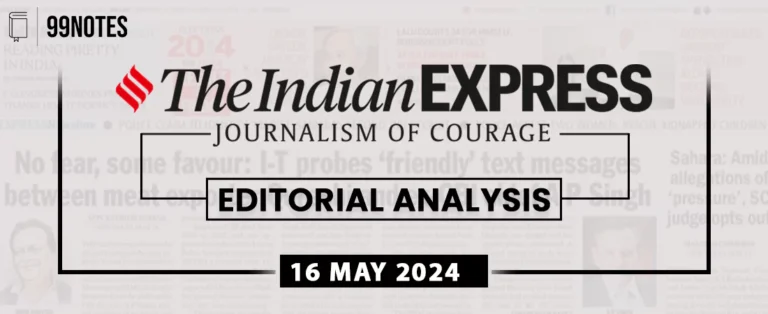4 May April 2024 : Indian Express Editorial Analysis
1. Weather proofing polls
| Topic: GS2 – Governance – Government policies – Interventions for development in various sectors |
| Context: |
|
The Significance of General Elections:
- India, as the largest democracy in the world, is currently amidst its general elections, a moment of critical importance with a staggering 96.88 crore eligible voters.
- Each vote cast signifies a commitment to democracy, and the outcome of these elections holds sway not only over India but also reverberates globally, influencing various world events.
- Amidst the plethora of democracies holding elections, it is India’s electoral process that stands out as paramount in deepening democratic values worldwide.
Participation and Efforts by Election Commission and Civil Society:
- Efforts to enhance participation in the elections are commendable, with the Election Commission of India (ECI) striving to reach out to voters, even in remote and inaccessible areas.
- Civil society organizations and the media have also played significant roles in raising awareness about the importance of voting.
- The enthusiastic response from voters in the initial phases of voting reflects a positive trend.
- However, discussions surrounding voter turnout often highlight a significant challenge posed by the hot weather, which can potentially deter greater participation.
Challenges Posed by Weather Conditions:
- Weather, an inevitable factor in the election schedule, presents a substantial challenge.
- With the need to conclude elections before the expiry of the term of the 17th Lok Sabha on June 16, the schedule spans from April to June, coinciding with India’s scorching summer temperatures.
- Despite the ECI considering weather conditions, the final deadline necessitates elections during this period, leading to concerns about voter discomfort and potential health risks.
Mitigation Measures Implemented by ECI:
- Acknowledging the severity of the weather, the ECI swiftly implemented mitigation measures.
- Collaboration with relevant departments led to the establishment of a task force to monitor heatwave conditions and take mitigatory measures if necessary.
- Instructions were issued to ensure the provision of shelter, drinking water, and fans at polling stations, aiming to alleviate voter discomfort.
Concerns Regarding Campaigning and Voter Apathy:
- While measures at polling stations provide some relief, campaigning activities remain a challenge, with political leaders and party cadres exposed to the harsh outdoor conditions.
- Reports of leaders fainting during rallies highlight the risks associated with campaigning in extreme weather.
- Such conditions may contribute to voter apathy, particularly in rural areas where voters may have to travel long distances under the blazing sun.
Climate Change and Future Implications:
- These challenges are not isolated incidents but rather indicative of the norm, exacerbated by India’s typical summer temperatures.
- With temperatures soaring above 40 degrees Celsius in various regions, future elections held during May-June may face similar extreme weather issues, aggravated by global warming and climate change.
Proposal for a Weather-Friendly Election Timetable:
- In light of these challenges, there is a pressing need to debate the timing of elections, considering the well-being of voters, campaigners, and election officials.
- A weather-friendly timetable for general elections is proposed, emphasizing the importance of maximizing participation to strengthen democracy.
- While not part of the High-Level Committee on Simultaneous Elections’ recommendations, this proposal underscores the seriousness of climate concerns and the necessity for a collective response from all stakeholders to ensure conducive weather conditions for elections.
Conclusion:
- Addressing the impact of weather on elections is crucial for the health of democracy.
- By advocating for a weather-friendly election timetable, stakeholders can pave the way for maximum participation and uphold democratic values in India and globally.
- This collective endeavor is essential to navigate the challenges posed by climate change and safeguard the integrity of electoral processes.
| What are the Challenges to Increasing Voter Turnout in India ? |
Voter Apathy:
Logistical Challenges:
Lack of Awareness and Literacy:
Inconvenient Election Dates:
Security Concerns:
Migration:
Technological Challenges:
Political Parties and Candidates:
Voter Identification:
|
| Practice Question: Discuss the significance of weather conditions in influencing voter turnout and the democratic process during India’s general elections. Evaluate the measures undertaken by the Election Commission of India (ECI) to mitigate the impact of extreme weather on electoral participation. (250 words/15 m) |
2. RAREST OF RARE RISK
| Topic: GS2 – Social Justice – Health
GS3 – Science & Technology – Bio-technology |
| Context: |
|
Oxford-AstraZeneca Vaccine and Thrombosis Concerns:
- The aftermath of the Covid-19 pandemic continues to unfold, with recent developments surrounding the Oxford-AstraZeneca vaccine drawing attention.
- The vaccine has been linked to a rare adverse side effect known as thrombosis with thrombocytopenia syndrome (TTS), prompting legal action against the company in the United Kingdom.
- This article explores the evolution of AstraZeneca’s stance on TTS and the implications for its widespread use, particularly in India’s vaccination program.
Understanding Thrombosis with Thrombocytopenia Syndrome (TTS):
- TTS, also referred to as vaccine-induced prothrombotic immune thrombocytopenia (VIPIT) or vaccine-induced immune thrombotic thrombocytopenia (VITT), is a rare syndrome associated with adenoviral vector Covid-19 vaccines.
- TTS is a rare condition characterized by the formation of blood clots (thrombosis) in blood vessels and a low number of blood platelets (thrombocytopenia).
- The article elucidates the symptoms, timing, and severity of TTS, categorizing it into two tiers based on age groups and associated risks.
- Despite being a known risk, TTS was not adequately captured in traditional vaccine trials due to their expedited nature and limited statistical power to detect rare events.
Incidence and Fatality Rates of TTS:
- The article provides insights into the varying incidence and fatality rates of TTS across different regions, highlighting the heterogeneity of reporting and susceptibility factors.
- It cites examples of countries with high reporting rates and fatality rates compared to those with lower rates, attributing these differences to factors such as vaccine usage recommendations, demographics, and environmental influences.
Global Response and Regulatory Decisions:
- The response to TTS has been marked by diverging views among experts and regulatory authorities worldwide.
- The suspension of AstraZeneca vaccine use by several countries, particularly in Europe, sparked debates over vaccine safety and risk assessment.
- Despite initial concerns, regulatory bodies like the European Medicines Agency (EMA) and the WHO’s Global Advisory Committee on Vaccine Safety (GACVS) affirmed the vaccine’s positive benefit-risk profile, emphasizing the importance of vaccine confidence amidst the pandemic.
Legal and Ethical Implications:
- Legal proceedings against AstraZeneca in the UK underscore the ethical dilemmas surrounding vaccine safety and compensation for adverse effects.
- The article discusses the potential financial implications for governments and the need for transparency in risk communication to maintain public trust in vaccination efforts.
- Ultimately, it stresses the importance of aligning regulatory decisions with public health imperatives and ethical considerations.
Conclusion:
- The article highlights the ongoing challenges posed by TTS in the context of Covid-19 vaccination campaigns.
- It emphasizes the need for evidence-based regulatory decisions, transparent risk communication, and ethical resolution of legal disputes to foster vaccine confidence and navigate the complexities of a global health crisis.
| What is Thrombosis with Thrombocytopenia Syndrome (TTS)? |
About
Mechanism
Symptoms of TTS
Who are at risk?
What is Covishield?About
Covishield in India
AstraZeneca vaccine in other countries
Observations made by WHO
|
| PYQ: In the context of vaccines manufactured to prevent COVID-19 pandemic, consider the following statements: (2022)
1. The Serum Institute of India produced a COVID-19 vaccine named Covishield using an mRNA platform. 2. Sputnik. V vaccine is manufactured using a vector-based platform. 3. COVAXIN is an inactivated pathogen-based vaccine. Which of the statements given above are correct? a) 1 and 2 only b) 2 and 3 only c) 1 and 3 only d) 1, 2 and 3 Answer – B |
| Practice Question: Discuss the challenges and ethical considerations arising from the association of thrombosis with thrombocytopenia syndrome (TTS) with the Oxford-AstraZeneca COVID-19 vaccine. (250 words/15 m) |





